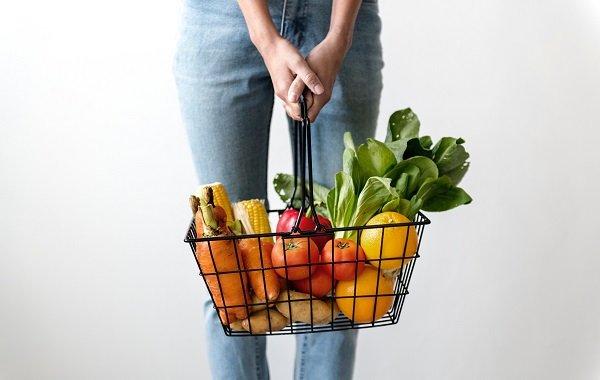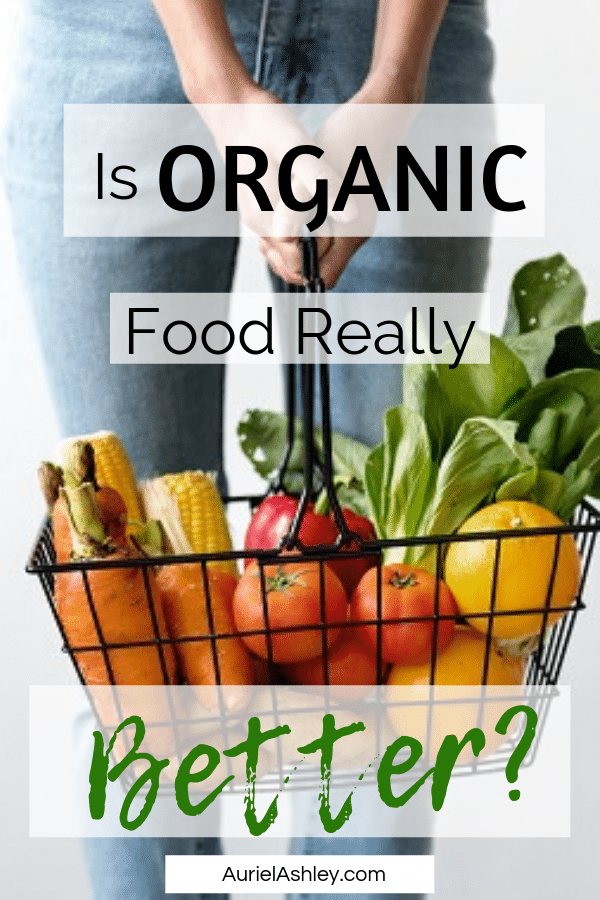Is Organic Food Really Better?
We’ve all been in this scenario: you’re at the supermarket with your shopping list in tow. What you think will be a simple trip turns much more complicated when you’re faced with all the various labels to interpret. In the produce section you’re forced into another decision: to buy conventional or organic.
Which one will you choose? We know that organic is supposed to be better -- less chemicals, more nutritious, tastier and environmentally friendly. But is it really? And don’t get me started on the cost! Often times organic can be nearly double the price of conventional alternatives. Is there really a difference or is it just a marketing ploy?
Today organic food is a $50 billion industry and one of the fastest growing food sectors in the US. People are seeking out organic options more than ever before.
Personally, I never thought much about organic food until recently. I assumed that it was at least somewhat healthier. But I didn’t see a compelling reason to splurge for organic, especially on a tight budget.
Then I started drinking celery juice. If you haven’t heard about this health phenomenon check out my post here. But for the last few weeks I’ve been drinking two cups of celery juice every morning. I tried both organic and conventional celery (from various grocery stores and even local farmers markets) and there was a noticeable taste difference between the two.
Across the board organic celery juice tasted substantially better than conventional, no matter where it was purchased. Juice from conventional celery was much more bitter juice, with a thinner consistency.
I was shocked and started to wonder if there really is something to this organic food movement. After tasting the difference firsthand, I decided to learn more about organic food and whether or not it’s really the better option.
What Does Organic Mean?
We’re bombarded with labels at the grocery store and it can be hard to make sense of it all. Let’s break down what organic actually means.
Organic food is grown and processed according to national standards set by the US Department of Agriculture. These standards relate to things such as soil quality, animal-raising practices, pest and weed control, and the use of additives. This promotes healthier farming practices both for the environment as well as for consumption.
To be more specific, organic crops must be produced without
- Synthetic pesticides
- Synthetic fertilizer
- Sewage sludge
- Irradiation
- GMOs
- Growth hormones or antibiotics for animals
In addition to being free of hormones and antibiotics, organically raised animals eat an organic diet (free of GMOs, additives, and animal byproducts) and have access to outdoor spaces, including pastureland for grazing.

Food with the “USDA Organic” label contain at least 95% organic ingredients and comes from a farm that has been inspected and found to meet the USDA requirements.
You might also see similar labels like “100% Organic” which is even better and will also have the USDA seal. In contrast, “Made with Organic” means that at least 70% of ingredients are organic, but you won’t see the USDA label on these items as they are not as strictly regulated.
Why Does It Matter?
Not only do all those things sound pretty unpleasant (sewage sludge?!), they have been linked to poor health outcomes. These toxins have the potential to cause hormone disruption, neuro-developmental issues, neurological diseases, chronic illnesses, inflammation, and cancer, among other things.
Ready to throw out all your non-organic food?
Before you do, keep in mind that organic food may not have synthetic pesticides, but does have organic pesticides. These are not necessarily safer. Organic doesn’t mean 100% free of all the bad stuff, but it is substantially less.
There’s still A LOT of debate over whether organic food is definitively more healthy and if so, by how much.
The Benefits of Organic Food
Although there’s a lot scientists don’t know or haven’t yet proven about the differences between conventional and organic foods, there are quite a few known benefits.
Less pesticides
Your chance of being exposed to pesticide residue are much less with organic food. One study found that organically grown crops had one-third the amount of pesticide residue compared to conventionally grown crops. They were also less likely to contain residue from more than one type of pesticide.
Fresher and better tasting
Because there are no preservatives to make them last longer, organic foods tend to be fresher when purchased. The better soil quality used with organic crops (due to the natural methods of fertilization used like manure and composting) helps to produce healthy, stronger plants. This improves the quality and the taste.
No hormones or antibiotics in animal products
Whatever toxins an animal is exposed to, be it gmo feed, growth hormones or antibiotics, gets stored in fat tissue of the animal through bioaccumulation. When we consume meat, dairy products, eggs, etc. those toxins are then transferred to us, causing problems like hormone imbalances, faster rates of maturation in children, inflammation, cancer and more.
More nutrients
This is widely debated and there is still disagreement within the scientific community as to whether the difference in nutrients is significant. However, many studies have shown the nutritional value of organic foods to be superior. A 2016 European study found 50% more of certain nutrients including omega-3 fatty acids in organic meat and milk. On average, organic produce was found to contain 21% more iron, 27% more vitamin C, 29% more magnesium and 13% more phosphorus than their conventional counterparts.
GMO-free
Genetically Modified Organisms (GMOs) or genetically engineered (GE) foods are plants whose DNA has been altered in ways that cannot occur in nature. They are most commonly designed to be resistant to pesticides or produce their own insecticide. The FDA and biotech companies claim that GMOs are safe, but no long term studies have been conducted to confirm this. In fact, GMOs have been linked to increased food allergies and gastro-intestinal (gut) issues in humans. Many believe that they also increase the risk of cancer (though this has not yet been scientifically proven).

Should You Buy Organic?
There’s still a great deal of controversy over organic food and whether there is enough evidence to prove its worth. Personally, I can’t help but feel a little concerned about what I’m putting in my body when I eat non organic foods--pesticides, GMOs, hormones, antibiotics.
Unfortunately, it may take many years to fully understand the long term effects these things could have on our health. There’s still so much that is being uncovered about organic foods--good and bad.
With that being said, my recommendation is to, first and foremost, focus on eating as many fruits, vegetables, and whole grains as you can, organic or not. Reducing the amount of processed food in your diet is going to make a huge difference for your health.
If you are interested in transitioning to a more organic diet, but like many of us, are concerned about the price tag there’s good news! Not everything you buy actually needs to be organic. By making a few swaps you can avoid many of the dangers of conventional foods and still stay within your budget (or close to it).
Fruits and Vegetables
Some types of conventionally-grown produce are much higher in pesticides, while others are low enough that buying non-organic is relatively safe. Some crops don’t require as many pesticides or are protected by a thicker skin. Take onions for example. Their pungent flavor is a natural insect repellent. Use the “Dirty Dozen” and the “Clean Fifteen” as your guide.
The Dirty Dozen - the top 12 fruits and vegetables with the most amount of pesticide residue that you should prioritize buying organic:
- Strawberries
- Apples
- Nectarines
- Peaches
- Celery
- Grapes
- Cherries
- Spinach
- Tomatoes
- Sweet bell peppers
- Cherry tomatoes
- Cucumbers
Bonus: Kale, collard greens and hot peppers are three recent additions to the Dirty Dozen, discovered to contain harmful pesticides.
The Clean Fifteen- produce with the least amount of pesticide residue that you don’t need to buy organic:
- Avocados
- Sweetcorn
- Pineapples
- Cabbages
- Frozen sweet peas
- Onions
- Asparagus
- Mangoes
- Papayas
- Kiwis
- Eggplant
- Grapefruit
- Cantaloupe
- Cauliflower
- Sweet potatoes
Animal Products
Unfortunately, when it comes to meat, dairy and eggs there’s a little less leeway. As much as possible you should buy these items organic. Remember, you are what you eat. Consuming animals that have been fed a GMO diet, and have been loaded with hormones and antibiotics is going to have a direct impact on you and your health. You want to avoid those as much as possible and choosing organic animal products, will allow you to control the substances that you allow into your body.
Seafood and Fish
There are no official standards for organic seafood in the US and most seafood won’t have an organic label unless it’s from overseas. It’s more important to look for fish that is wild-caught. These fish are free of the chemicals, dyes, and antibiotics that are fed to their farm-raised counterparts. Avoid the harmful toxins and compromised nutritional value by sticking to wild-caught seafood as much as possible.
Processed/Packaged Foods
This is really up to you. I don’t think it’s worth it to buy organic processed foods. For the majority of these types of items, you’ll have bigger things to worry about than whether they have an Organic label. Things like sugar, preservatives, artificial colors and flavors, salt, and the many other unpronounceable things on the labels are more of a concern, in my opinion. If I want something processed, I’m usually not thinking about the nutritional value. I don’t think organic is going to make a huge difference when it comes to cookies, chips and other processed goodies.
Where does that leave us?
Organic food is a complex subject with many contrasting opinions. But I think it’s hard to ignore the harmful substances and practices that are used with conventional food sources. However, there’s one major drawback of organic food: the price. And this keeps a lot of people from buying organic even though it seems to be the safer, healthier option.
Cost is definitely a concern for me, but as someone who suffers from inflammation, hormonal imbalance and gut health issues, I see a lot of reason to adopt a more organic diet. I’m not going to switch completely, but I do plan to slowly transition to organic options, starting with animal products and the “Dirty Dozen” list of produce.
Ultimately, you have to do what’s best for you. Even if you don’t plan to buy organic, make eating a healthy, balanced diet your top priority.
Hopefully I’ve given you some facts to help you make your own decision or encouraged you to do some more research on the subject.
What is your opinion on organic food?
Sources
- https://www.healthline.com/nutrition/pesticides-and-health#section8
- https://www.helpguide.org/articles/healthy-eating/organic-foods.htm
- https://www.prevention.com/food-nutrition/healthy-eating/a20453119/top-reasons-to-choose-organic-foods/
- https://foodrevolution.org/blog/the-dirty-dozen-plus-clean-fifteen-infographic/
- https://www.webmd.com/food-recipes/features/organic-food-better#1


